#desert fathers
Text
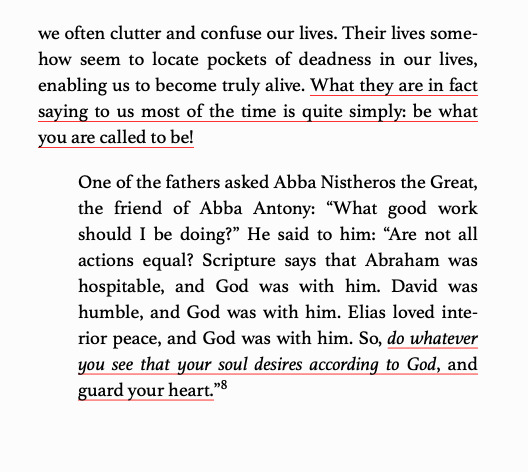
John Chryssaugis, In the Heart of the Desert: The Spirituality of the Desert Fathers and Mothers (Nistheros 1 in quotation)
34 notes
·
View notes
Text
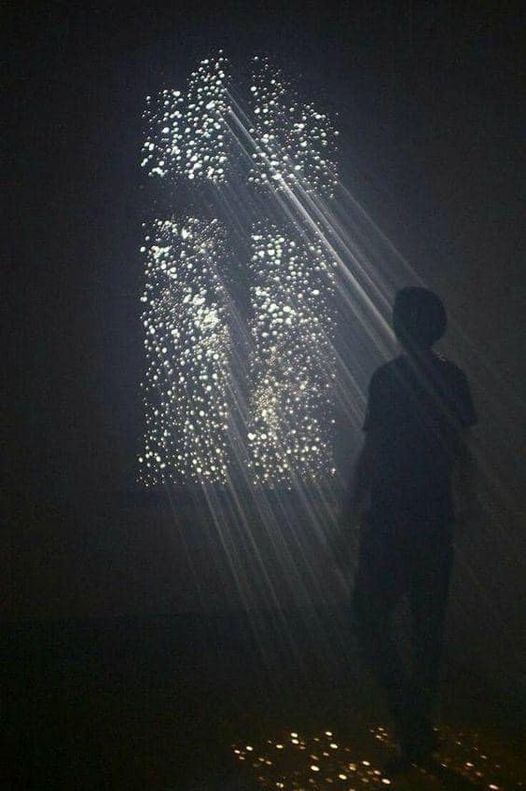
“If a man wants God to hear his prayer quickly, then before he prays for anything else, even his own soul, when he stands and stretches out his hands towards God, he must pray with all his heart for his enemies.
Through this action God will hear everything that he asks.”
~Abba Zeno
70 notes
·
View notes
Text

5 notes
·
View notes
Text
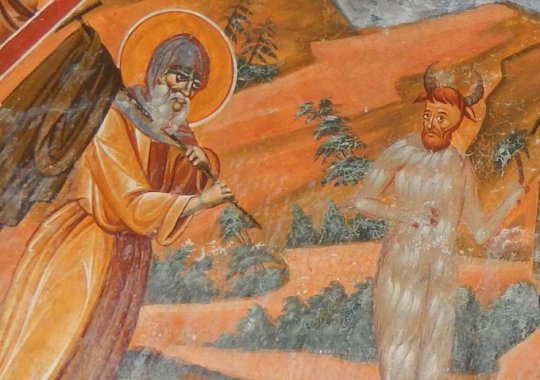
‘Whosoever is delighted in Solitude is either a Wilde Beast or a God’ FRANCIS BACON (1561 – 1626) Essays, On Friendship
Art: St Anthony and the Satyr
Story behind the art, roughly paraphrased from what I remember in the Vita Antonii (of Athanasius): While in the desert, Saint Anthony, then just Anthony, met a centaur and a satyr (thin on the ground but still something you could find in the late Roman Empire, especially in the deserts and wild places). They mocked him for being a Christian and then Anthony converted them through prayer, because that's how these things go. The centaur gave Anthony directions to find a friend and fellow hermit and the satyr asked for a blessing. As far as Saint Anthony's adventures, this was probably a fairly normal Tuesday afternoon for him.
3 notes
·
View notes
Text
A dog is better than I am because he has love and will not have to answer for his sins.
Abba Xanthias
2 notes
·
View notes
Text

“The Life of St. Anthony by St. Anthansius, Archbishop of Alexandria”
“And you should imitate me, just as I imitate Christ.” -1 Corinthians 11:1
“A 3rd-4th century desert monk, we know about St. Anthony from a biography written by St. Athanasius called Life of St. Anthony. It says that when people would visit St. Anthony at his desert home, “they heard tumults, many voices, and, as it were, the clash of arms. At night they saw the mountain become full of wild beasts, and him also fighting as though against visible beings, and praying against them.”
Selections:
5. But the devil, who hates and envies what is good, could not endure to see such a resolution in a youth, but endeavoured to carry out against him what he had been wont to effect against others.
First of all he tried to lead him away from the discipline, whispering to him the remembrance of his wealth, care for his sister, claims of kindred, love of money, love of glory, the various pleasures of the table and the other relaxations of life, and at last the difficulty of virtue and the labor of it; he suggested also the infirmity of the body and the length of the time. In a word he raised in his mind a great dust of debate, wishing to debar him from his settled purpose.
But when the enemy saw himself to be too weak for Antony’s determination, and that he rather was conquered by the other’s firmness, overthrown by his great faith and falling through his constant prayers, then at length putting his trust in the weapons which are “in the navel of his belly” [Job 40.16] and boasting in them–for they are his first snare for the young–he attacked the young man, disturbing him by night and harassing him by day, so that even the onlookers saw the struggle which was going on between them. The one would suggest foul thoughts and the other counter them with prayers: the one fire him with lust the other, as one who seemed to blush, fortify his body with faith, prayers, and fasting.
And the devil, unhappy wretch, one night even took upon him the shape of a woman and imitated all her acts simply to beguile Antony. But he, his mind filled with Christ and the nobility inspired by Him, and considering the spirituality of the soul, quenched the coal of the other’s deceit.
7. This was Antony’s first struggle against the devil, or rather this victory was the Savior’s work in Antony, “Who condemned sin in the flesh that the ordinance of the law might be fulfilled in us who walk not after the flesh but after the spirit” [Rom 8.3-4].
8. Thus tightening his hold upon himself, Antony departed to the tombs, which happened to be at a distance from the village; and having bid one of his acquaintances to bring him bread at intervals of many days, he entered one of the tombs, and the other having shut the door on him, he remained within alone. And when the enemy could not endure it, but was even fearful that in a short time Antony would fill the desert with the discipline, coming one night with a multitude of demons, he so cut him with stripes that he lay on the ground speechless from the excessive pain. For he affirmed that the torture had been so excessive that no blows inflicted by man could ever have caused him such torment.
But by the Providence of God–for the Lord never overlooks these who hope in Him–the next day his acquaintance came bringing him the loaves. And having opened the door and seeing him lying on the ground as though dead, he lifted him up and carried him to the church in the village, and laid him upon the ground. And many of his kinsfolk and the villagers sat around Antony as around a corpse.
But about midnight he came to himself and arose, and when he saw them all asleep and his comrade alone watching, he motioned with his head for him to approach, and asked him to carry him again to the tombs without waking anybody.
9. He was carried therefore by the man, and as he was wont, when the door was shut he was within alone.
And he could not stand up on account of the blows, but he prayed as he lay.
And after he had prayed, he said with a shout, “Here am I, Antony; I flee not from your stripes, for even if you inflict more nothing shall separate me from the love of Christ” [Rom 8.35]. And then he sang, “though a camp be set against me, my heart shall not be afraid” [Ps 26.3].
These were the thoughts and words of this ascetic. But the enemy, who hates good, marvelling that after the blows he dared to return, called together his hounds and burst forth, “You see,” said he, “that neither by the spirit of lust nor by blows did we stay the man, but that he braves us, let us attack him in another fashion.”
But changes of form for evil are easy for the devil, so in the night they made such a din that the whole of that place seemed to be shaken by an earthquake, and the demons as if breaking the four walls of the dwelling seemed to enter through them, coming in the likeness of beasts and creeping things.
And the place was suddenly filled with the forms of lions, bears, leopards, bulls, serpents, asps, scorpions, and wolves, and each of them was moving according to his nature. The lion was roaring, wishing to attack, the bull seeming to toss with its horns, the serpent writhing but unable to approach, and the wolf as it rushed on was restrained; altogether the noises of the apparitions, with their angry ragings, were dreadful.
But Antony, stricken and goaded by them, felt bodily pains severer still. He lay watching, however, with unshaken soul, groaning from bodily anguish; but his mind was clear, and as in mockery he said, “If there had been any power in you, it would have sufficed had one of you come, but since the Lord has made you weak, you attempt to terrify me by numbers: and a proof of your weakness is that you take the shapes of brute beasts.” And again with boldness he said, “If you are able, and have received power against me, delay not to attack; but if you are unable, why trouble me in vain? For faith in our Lord is a seal and a wall of safety to us” [cf. Prov 18.11]. So after many attempts they gnashed their teeth upon him [cf. Mk 9.18], because they were mocking themselves rather than him.
10. Nor was the Lord then forgetful of Antony’s wrestling, but was at hand to help him. So looking up he saw the roof as it were opened, and a ray of light descending to him. The demons suddenly vanished, the pain of his body straightway ceased, and the building was again whole. But Antony feeling the help, and getting his breath again, and being freed from pain, besought the vision which had appeared to him, saying, “Where were you?
Why did you not appear at the beginning to make my pains to cease?” And a voice came to him, “Antony, I was here, but I waited to see your fight; since you have endured, and did not surrender, I will always be a helper for you, and will make your name known everywhere.” Having heard this, Antony arose and prayed, and received such strength that he perceived that he had more power in his body than formerly. And he was then about thirty-five years old.”
Painting by Michelangelo: The Torment of Saint Anthony
5 notes
·
View notes
Text
EPISODE #184: HOPPY EASTER, FROM THE DESERT FATHERS
On this Good Friday — which wasn’t so great for the protagonist — let us be enlightened by the strange koans of the Desert Fathers. These were the 5th Century CE monks who started the whole “move to the desert” trend, leaving their elite lives in the cities for the hardship of a tiny hole dug in a limestone cliff.
With new spring soundscapes by our own musical monk, RedBlueBlackSilver, and…

View On WordPress
6 notes
·
View notes
Text
Lectio Divina: A Living Words Meditation
Lectio Divina: A Living Words Meditation
WHAT IS LECTIO DIVINA?
Lectio (Latin)-lesson, teaching, or a group of texts. Reading in it’s most basic form.
Divina (Latin)- divine, of a deity, divinely inspired, or prophetic.
Lectio Divina– divine readings, or spiritual readings, to put it plainly. This is how people used the term for the majority of the middle ages which would suggest that lectio divina is synonymous with sacra pagina,…

View On WordPress
#alexandria#bible study#christianity#contemplation#desert fathers#esoteric christianity#how to#inner transformation#inner wisdom#lectio divina#meditation#mysticism#philosophy#spirituality#the word of god
11 notes
·
View notes
Note
I nominate St. Anthony the Great/St. Anthony of the Desert/St. Anthony of Egypt. You pick a name bc he has many I’m just trying to differentiate between him and Anthony of Padua
Father of all monks let’s GOOOOO
oooooooohhhhhhhhh finally a vote for one of the desert fathers!!! You'll have to send in some propaganda, anon, as St. Anthony of Padua is way ahead for nominations!
St Anthony the Great will do, and he is so cool.
#st anthony the great#st anthony of egypt#st anthony of the desert#desert fathers#catholic#catholicism#catholic saints#catholic monks#roman catholicism#catholic saint tournament#polls#christianity
2 notes
·
View notes
Text
Remembering Abba Sisoes.
15 notes
·
View notes
Video
Saint Anthony the Great (Feast Day - January 17th)
2 notes
·
View notes
Photo
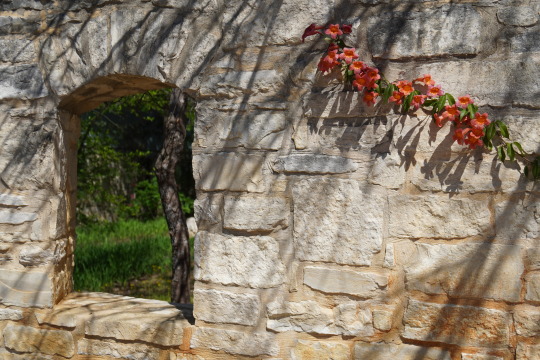
Abba Ammonas was asked, “What is the ‘narrow and hard way’?” (Matthew 7.14) He replied, “The ‘narrow and hard way’ is this, to control your thoughts, and to strip yourself of your own will, for the sake of God. This is also the meaning of the sentence, ‘Lo, we have left everything and followed you’.” (Matthew 19.27)
~Sayings of the Desert Fathers
(Photo © dramoor 2023 Ladybird Johnson Wildflower Center, Austin, Texas)
#Desert Fathers#Orthodox Christian#narrow and hard way#Scriptures#following Jesus Christ#deny self#God's will#travel#photography#photographers on tumblr#Austin TX#Ladybird Johnson Wildflower Center#flowers#crossvine#wall#window
13 notes
·
View notes
Text
In prayer we are allowed to dive into the place of silence, where everything is already whole and complete, where we can sense a deep peace amid all insults and injuries.
From Heaven Begins Within You: Wisdom of the Desert Fathers by Anselm Gruen. Chapter: Contemplation as a Path of Healing (pg. 115)
0 notes
Text
Early Christians had a complete Bible by the 4th century.
But that’s not the only thing they were reading to deepen their faith.
In the early Church, there were a lot of great books being passed around.🧵
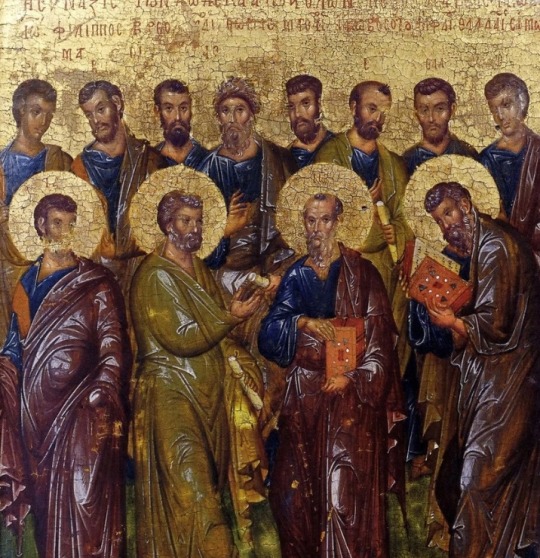
The Didache, Anonymous, 1st century
The Didache is a brief discourse that contains moral and ritualistic teachings — a handbook for a Christian life.
It’s speculated the apostles wrote it, and contains the formulas for baptism and eucharist that are still used today.
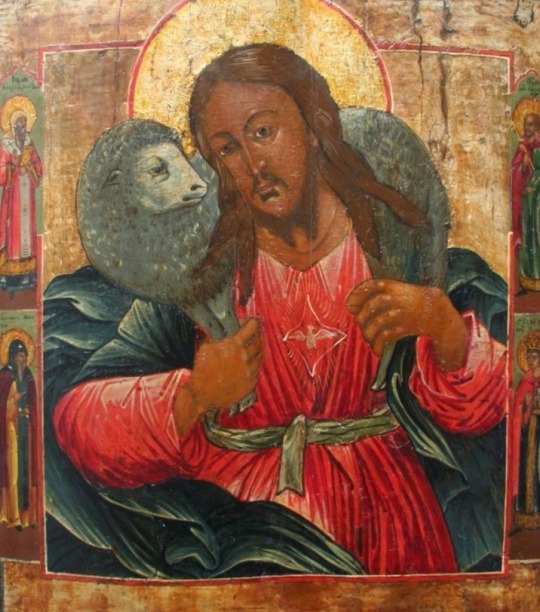
The Shepherd of Hermas, Hermas, 2nd century
St. Iranaeus considered it to be canonical scripture.
Though it missed the cut, it’s a fascinating work that centers around the life of a former slave who is given mystical visions and parables informing him how to live a faithful life.
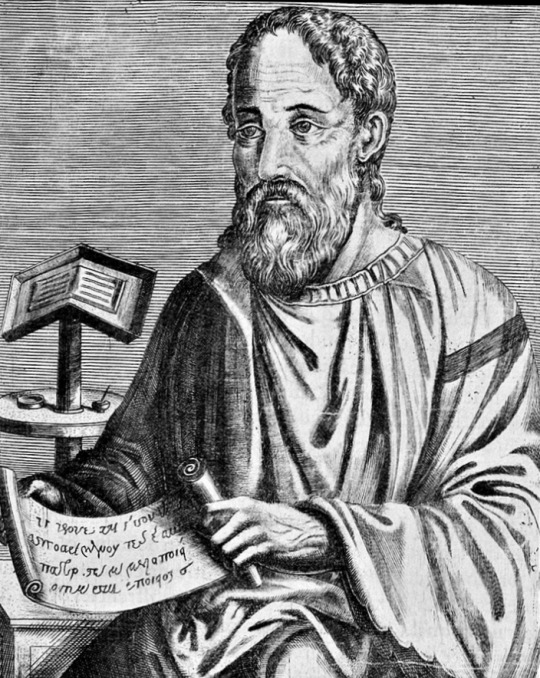
Church History, Eusebius, 4th century
Eusebius had access to one of the largest sources of knowledge in the ancient world: Library of Caesarea.
This allowed him to piece together this contentious history of the church through letters, martyrdom accounts, and lists of bishops.
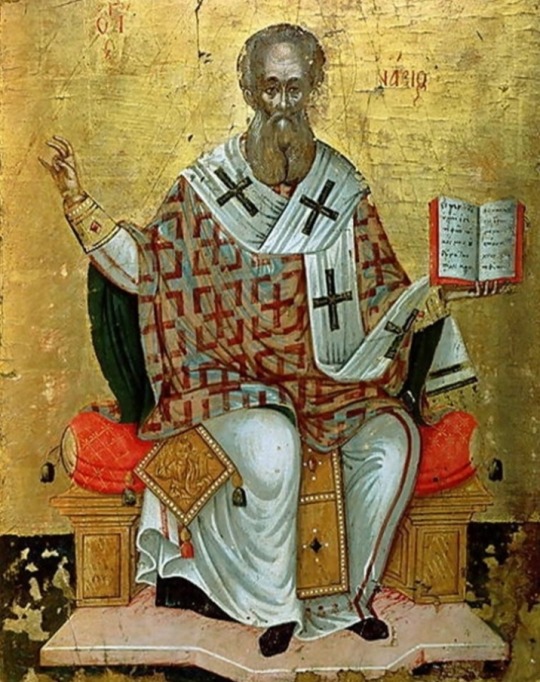
On the Incarnation, Athanasius, 4th century
C.S. Lewis said of it:
“When I first opened On the Incarnation, I soon discovered…that I was reading a masterpiece.“
Here, Athanasius presents the incarnation as a solution to man's fallen nature, or what he calls the “divine dilemma."
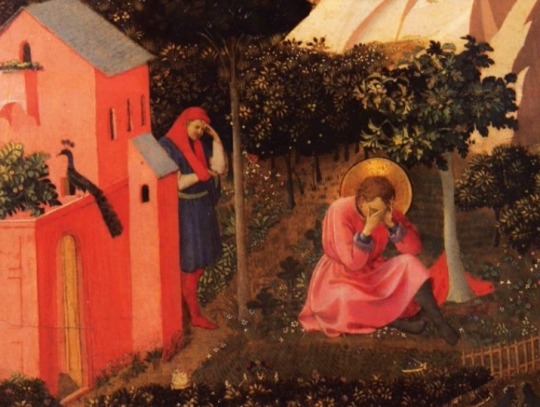
Confessions, Augustine, 5th century
Augustine's masterpiece is an autobiography where he ponders his troubled youth and eventual conversion to Christianity as he traversed the Roman empire.
It’s a story of the struggle against sin and the metanoia of a future saint.

The City of God, Augustine, 5th century
An intellectual tour de force, The City of God depicts the ultimate struggle of the human condition — a war where all must make a choice between the “earthly city” and the “city of God.”

Sayings of the Desert Fathers, various authors, 5th century
Ancient wisdom from desert hermits.
It’s a collection of wisdom stories and maxims from the desert fathers, who were some of the earliest hermits and ascetics.
Early monks looked to these stories for spiritual guidance.
#Early Christians#Bible#books#The Didache#The Shepherd of Hermas#St. Iranaeus#canonical scripture#Church History#Eusebius#Library of Caesarea#On the Incarnation#Athanasius#C.S. Lewis#Confessions#Augustine#The City of God#Sayings of the Desert Fathers#desert hermits#ancient wisdom#desert fathers
0 notes
Text
A brother lived in the cells and in his solitude he was troubled. He went to tell Abba Theodore of Pherme about it. The old man said to him, ‘Go, be more humble in your aspirations, place yourself under obedience and live with others.’ Later, he came back to the old man and said, ‘I do not find any peace with others.’ The old man said to him, ‘If you are not at peace either alone or with others, why have you become a monk? Is it not to suffer trials? Tell me how many years you have worn the habit?’ He replied, ‘For eight years.’ Then the old man said to him, ‘I have worn the habit seventy years and on no day have I found peace. Do you expect to obtain peace in eight years?’ At these words the brother went away strengthened.
He also said, ‘In these days many take their rest before He gives it them.’
0 notes
Text
"Alan Jones, former dean of Grace Cathedral in San Francisco, writes that those who are willing to take the journey into the desert have two main features: “a heart and mind willing to pursue the truth wherever it may lead (and the ability to acknowledge that they may be wrong); and the kind of sensibility (which is the joining of the mind and heart) that is captive to wonder, mystery, and awe.”
Desert Fathers and Mothers: Early Christian Wisdom Sayings—Annotated & Explained" by Christine Valters Paintner
1 note
·
View note